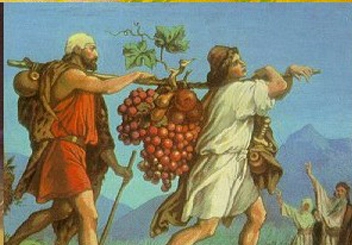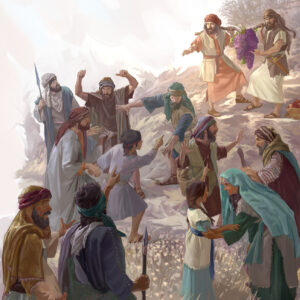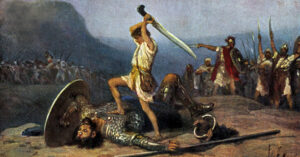Moses was stuck.
He was on the wrong side of a river, and there was nothing he could do about it. The Lord Himself had told Moses he would not be permitted to cross that river, even though he could clearly see the Lord’s promise right in front of him.
The mightiest prophet of God who had ever existed, who had sat in God’s presence until his whole face glowed, who personally led the people out of slavery in Egypt, who had been the conduit of miracle after miracle to provide for them, and who had successfully shepherded them for decades, was blocked from entering the Promised Land because of unbelief. And he wasn’t alone; everyone else of his generation were similarly cursed to die in the wilderness within sight of the promise.
It would take an entirely new generation with different vision to cross over into the blessing, and to be the ones that fulfilled God’s vision of a people for His purposes, to build a holy land with Him.
There was, as we know, an exception: along with the younger generation were Joshua and Caleb, who had first seen the blessings of the new land that God said He was giving them, had believed God despite the clear and obvious dangers that awaited them, and had encouraged Moses’ generation to lay their fears at God’s feet and rise up and take the land.
Only these two faithful elders would be permitted to lead the younger generation into that new, unknown, and intimidating adventure. They certainly needed the leadership and wisdom of Moses’ generation. But only Joshua and Caleb were judged suitable for this leadership, because out of all Israel’s elders, only they believed God despite much uncertainty.
Today, the elder church finds itself in a similar quandary.
Like Moses, they’ve been in charge for decades. There are certainly giants of Christianity who have faithfully presented the words of God to their flocks. There is no doubt that those ministries have led their people out of bondage, and helped maintain order and discipline in their camps for many years.
But God has issued a new call – it’s time to move into something new, something long prophesied and long promised, a new and rich home for His people. And the younger generation has heard the call and is responding – while the older generation of leaders looks at the very real challenges and giants in the land, and trembles at the dangers, and refuses to cross into the land.
It’s not that there is no risk – there is definitely great danger and there are real and powerful forces arrayed against the Church, and it will take the Lord’s wisdom and authority and power to kill the giants and bring His order and peace to this new land.
But just like Moses and the unbelieving elders of Israel, today’s elders counsel their flocks and each other that it’s not safe, that the Lord simply cannot be commanding this new situation, that the giants are too large and powerful. In fact, they’d rather go back to Egypt than move forward.
In case it’s not already obvious, I’m speaking here of the conservative church fighting to maintain the status quo – to “conserve” the old ways at all costs, if not return to an even earlier morality. But a younger generation has listened to the glowing reports of those scouts who have seen the land. These upstarts have heard the Lord calling them into something new, and they’re looking across the river at a Promised Land of “every tribe, tongue, and people” in remarkable diversity. They see Galatians 3:28, that there is neither Jew nor Greek, slave nor free, male nor female, in a new light. They reject patriarchal teaching against women leading the church. They reject authoritarian teachers who treat them as servants if not slaves, instead of equal citizens in the Kingdom. They see the call to Peter in Acts 11 to mean that even LGBTQ people have been made clean and thus they refuse to continue excluding them from full participation. They see that call about “neither Jew nor Greek” as an invitation to welcome diverse and often confounding expressions of Christian faith and doctrine from other cultures, treasuring them just as richly as their own evangelical upbringing.
And they do see the “giants in the land,” those challenges that are certain to come with inviting into the Kingdom people who don’t look like them, or think like them, or even worship like them. But they’re fearless in the face of those challenges.
And so they’ve been stepping out from beneath the control of the elder generation, and are beginning to actually take the land themselves. Churches are rising up that are willing to go at risk with the Lord, reject discrimination and fear, and especially reject the nay-saying call of the self-appointed elders, and they’re already beginning to experience the blessings of that new land.

Those churches who have been willing to move into that land of inclusion and welcome have proclaimed glowing reports of the fruit – the picture of clusters of grapes so large it takes two men to carry them – and the younger generation believes those reports, and is willing to join the migration into that new land.
That migration isn’t without opposition – there are plenty of giants in the land, not just spiritual forces, but practical issues the migrants must face. How do they integrate such diversity, to truly become one people? How do they deal with excesses and abuses that for years were suppressed by authoritarian control and public shame and fear of shunning? How do they overcome the fear of otherness that’s been programmed into them for generations? And how do they honor and love those that they are spiritually leaving behind, even as they must physically remain in relationship?
But like Caleb, they say “we should by all means go up and take possession of it, for we will surely overcome it” (Numbers 13:30) and “The land which we passed through to spy out is an exceedingly good land. If the Lord is pleased with us, then He will bring us into this land and give it to us – a land which flows with milk and honey. Only do not rebel against the Lord, and do not fear the people of the land, for they will be our prey. Their protection has been removed from them, and the Lord is with us; do not fear them.” (Numbers 14:7-9)

And the elder generation is being left behind, on the other side of that river. And they’re angry and fighting back. It’s not enough for them to let the migrants go – they insist on remaining together on the wrong side of the Jordan. As with Caleb and Joshua, “all the congregation said to stone them with stones.” (Numbers 14:10) (There are even calls today from conservative preachers to execute LGBTQ people.)
Sure, this is not a perfect analogy. The elder generation isn’t dying out before the migration begins. The Jordan River won’t part itself for a single massive movement into the Promised Land. There’s probably not going to be some Jericho moment where they’ll march around a city and all the opposition will fall and the enemies will scatter in fear.
But I think it’s still a useful picture of what’s going on in this moment in the Church’s history. The younger generation have heard a new call, is acting on it, thus confounding the elders, and is becoming the people of God in a way that has not been seen before on the earth. They’re taking the land and claiming the promises of God as their own. It’s not some set of physical promises – it’s seeing the spiritual Kingdom of God beginning to appear in all its manifold, diverse, multicolored rainbow, unified glory.
And I suspect that the Lord’s response to the doubting elder generation will be much as it was to Israel: “Surely all the men who have seen My glory and My signs which I performed in Egypt and in the wilderness, yet have put Me to the test these ten times and have not listened to My voice, shall by no means see the land which I swore to their fathers, nor shall any of those who spurned Me see it. But my servant Caleb, because he has had a different spirit and has followed Me fully, I will bring into the land which he entered, and his descendants shall take possession of it.” (Numbers 14:22-24)
And the Lord then proceeded to bluntly state His own direct pushback against those who had refused to trust Him: “you will know My opposition. I, the Lord, have spoken, surely this I will do to all this evil generation who are gathered together against Me. In this wilderness they shall be destroyed, and there they will die.” (Numbers 14:34-35)
Interestingly, even after that hard word from the Lord, there were some of that older generation in Israel who still tried to move on their own into the Promised Land. They wanted to own the land without trusting the Lord. And just as the Lord had warned them, they failed. The inhabitants of the land overcame them; Numbers 14:39-45 tells how the Amalekites and Canaanites struck down the rebel warriors who thought they were fulfilling the Lord’s promise.
Trying to inhabit the Promised Land without believing the new direction that the Lord had given proved impossible. Those giants were too strong, and the people who tried by their own strength were slaughtered.
So to enter a kingdom of “every tribe and people and tongue and nation” (Revelation 7:9) a migrant generation must first believe the Lord inviting them into a new Promised Land, and they must reject the call to fear its dangers and challenges. And ultimately, they must not fight in their own strength, but let the Lord win their battles.

I was raised on much fear of the giants. I heard the reports of the spies describing the new land, and could only see the challenges. Just as the sons of Israel saw the Nephilim inhabitants of Canaan as giant angel/human hybrid demigods inhabiting the land, I saw the issues of an inclusive Kingdom as insurmountable demonic strength. Even stories of amazing grace and ministry and salvations and changed lives and the presence of the Holy Spirit in those inclusive congregations wasn’t enough to convince me. No matter how real and huge was the fruit being shown by those scouts, I responded just like the people of Israel: “Would that we had died in the land of Egypt!” (Numbers 14:2)
But I finally heard the Lord speaking to my heart to put away my fears, and I “stepped across the line” to stand with today’s Joshuas and Calebs, calling the people into belief and trust and to reject our doubt that the Lord can do miracles beyond our ability to comprehend.
And I’m thankful, in particular, for the internet and social media. Despite its real dangers and risks, it’s created a younger generation to a new ability to see the Lord’s spirit in peoples who are very different than themselves, despite diverse appearances and practices and doctrines. They hear the older generation counseling various forms of xenophobia – fear of the other – and have rejected those calls. They think globally. They reject discrimination of all kinds. They are not always wise and they need elder leadership, but they see with vision that the elders often lack. Perhaps this truly is the grace of the Lord, that for the first time in history a generation is arising that can actually fulfill Revelations 7:9 – but it won’t look like what the older generation thought.
So here’s where this elder generation can still participate. As with Caleb and Joshua, the younger generation need elder leadership to navigate the battles to follow, and sometimes to remind them that the battle is not theirs, it is the Lord’s, and leading with worship is how to win.
And so in His grace and mercy, the Lord has not yet stopped calling His people from the elder generation. He gave Israel “ten times” to repent and be willing to enter the land (Numbers 14:22), before finally cutting them off. While I consider myself “late to the party,” only recently finding myself on the side of Joshua and Caleb, I think there’s grace for me and other elders like me to “enter the land” with the younger generation, and I trust that some things the Lord has graciously and exceedingly patiently taught me over the years can be used to shepherd this younger generation and help them win those battles that will follow. There are still giants and the land must be conquered – there will be battles – but by God’s grace we can be confident that there is nothing that can stand against us.
Finally, I’m well aware that I’m skipping over any discussion of what the elder generation emphatically considers sin or heresy or apostasy. This essay is not intended to address such concerns; I’ve already written and said much about LGBTQ issues and many challenges I see in the evangelical church, and I’d refer you to those discussions on my blog or podcast. Ultimately, my sense in this season is that the Lord is explicitly calling His people to set aside a number of long-cherished doctrinal positions, has given the younger generation open eyes and a discerning spirit to see a truth much more inclusive than the previous generation (much like Peter leading the Jewish Christians to welcome the Gentiles into the Kingdom), and He is challenging His people to step across that river with Him into that new land.

So like Caleb, I see before us a spiritual land of milk and honey and giant clusters of grapes, promising an unbelievable bounty of new wine, and it truly excites me. So I’ve told the Lord, “yes, I believe, and yes, I will follow You into that new land, even though I can’t see yet how You will slay the giants, but You did it once with a young boy armed with nothing but a sling and some stones, and so I know that You can do it again through this younger generation.”
So I’m in.
Are you with me? Let’s roll.
